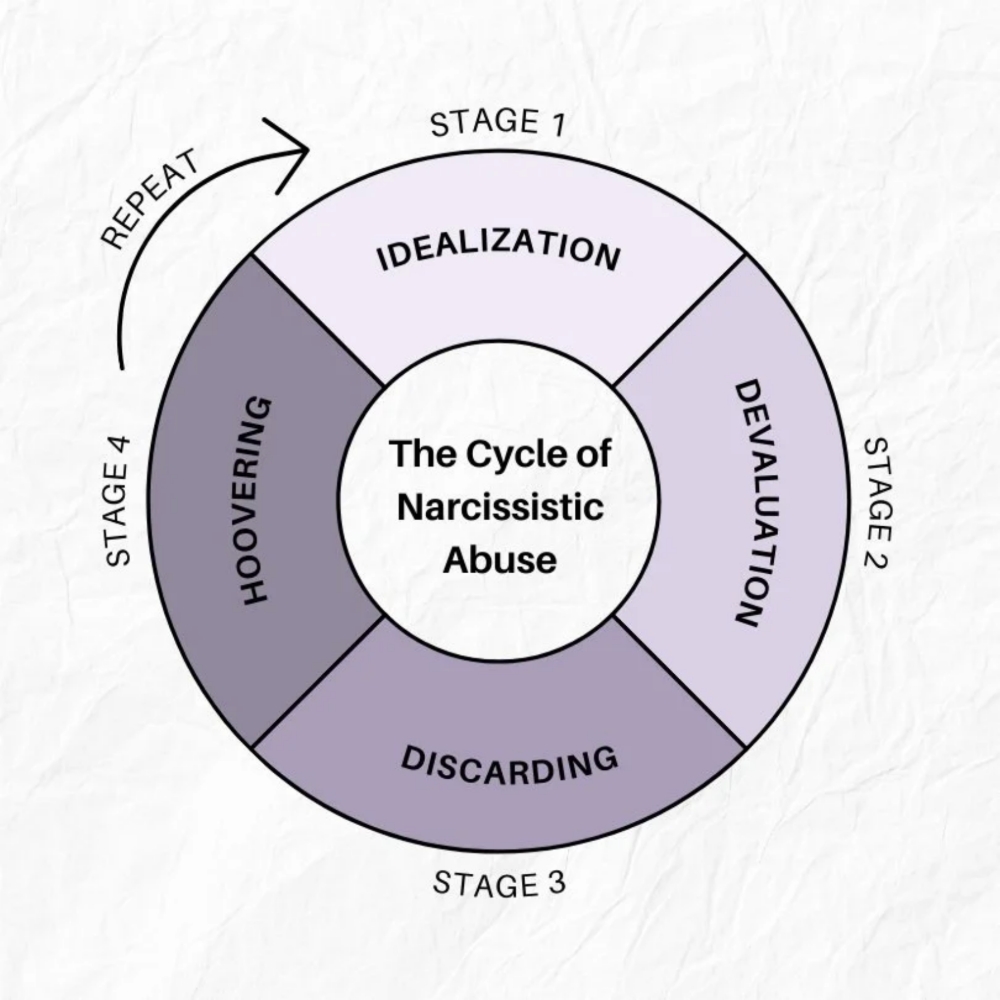Narcissistic Abuse Therapy
Narcissistic Abuse Therapy in Canada
Healing from Narcissistic Abuse Starts Here.
You may feel like you’re constantly walking on eggshells, second-guessing yourself, or wondering why even the smallest conversation can spiral into emotional chaos. Maybe you’ve started to doubt your own memory, your reactions, or even your worth. If someone in your life makes you feel confused, powerless, or like you’re “too sensitive”, you’re not alone.
Many people experiencing narcissistic abuse find it hard to explain what’s happening, especially because the harm is often subtle, emotional, and invisible to others. Whether you’ve experienced gaslighting, manipulation, silent treatment, emotional invalidation, or cycles of idealization and devaluation, it’s not just in your head, and you don’t have to figure it out alone.

At The Sereda Psychotherapy Group, we offer compassionate, validating therapy for those recovering from narcissistic abuse across Canada, including in British Columbia and Ontario. Whether it’s from a parent, partner, boss, friend, or someone else in your life, our therapists understand the unique impact of this kind of emotional harm, and we’re here to support you through healing, self-trust, and reconnection with your inner strength.

What Is Narcissistic Abuse?
Narcissistic abuse is a form of emotional and psychological abuse often perpetrated by someone who uses manipulation, control, and self-centered behavior to maintain power in a relationship. It often includes:
- Gaslighting (making you doubt your reality)
- Love bombing followed by withdrawal
- Emotional invalidation or blame-shifting
- Undermining your sense of confidence or independence
- Control over decisions, access to resources, or autonomy
- Triangulation, or using other people to manipulate or create rivalry/conflict
- Silent treatment to punish, isolate, or create insecurity
Symptoms of Narcissistic Abuse
It’s common to feel overwhelmed, ashamed, or disconnected during and/or after experiencing narcissistic abuse. You might notice:
- Hypervigilance or “walking on eggshells”
- Difficulty trusting yourself or others
- Low self-worth or a distorted self-image
- Persistent anxiety or guilt
- Shame or confusion about the relationship
- Intrusive memories or flashbacks
- Fawning (people-pleasing to avoid conflict)
- Isolation from support systems


Symptoms of Narcissistic Abuse
It’s common to feel overwhelmed, ashamed, or disconnected during and/or after experiencing narcissistic abuse. You might notice:
- Hypervigilance or “walking on eggshells”
- Difficulty trusting yourself or others
- Low self-worth or a distorted self-image
- Persistent anxiety or guilt
- Shame or confusion about the relationship
- Intrusive memories or flashbacks
- Fawning (people-pleasing to avoid conflict)
- Isolation from support systems

The Narcissistic Abuse Cycle: What You Might Be Experiencing
Many survivors describe a repeating cycle that makes it hard to leave or heal:
- Idealization – At first, you’re admired, praised, and made to feel special. This is often called “love bombing.”
- Devaluation – Gradually, the warmth fades. You may face criticism, blame, or emotional distance.
- Discard – You might be ignored, ghosted, or broken up with suddenly, leaving you confused and hurt.
- Hoovering – Just when you start to detach, they come back with apologies, charm, or guilt to pull you back in.
This cycle can feel disorienting and addictive. Therapy can help you recognize the pattern and break free from it.
The Narcissistic Abuse Cycle: What You Might Be Experiencing
Many survivors describe a repeating cycle that makes it hard to leave or heal:
- Idealization – At first, you’re admired, praised, and made to feel special. This is often called “love bombing.”
- Devaluation – Gradually, the warmth fades. You may face criticism, blame, or emotional distance.
- Discard – You might be ignored, ghosted, or broken up with suddenly, leaving you confused and hurt.
- Hoovering – Just when you start to detach, they come back with apologies, charm, or guilt to pull you back in.
This cycle can feel disorienting and addictive. Therapy can help you recognize the pattern and break free from it.

Book a Free 15-Minute Consultation
Narcissistic Abuse Can Happen in Any Relationship
We see clients who have experienced narcissistic abuse from:
- Romantic partners or ex-partners
- Parents or caregivers (often in childhood)
- Siblings or extended family
- Friends or roommates
- Religious or community leaders
- Employers or managers
It’s not about who they are, it’s about how their behaviour impacts you. If you’ve felt unseen, confused, controlled, or emotionally invalidated, therapy can help you make sense of your experience and rebuild what was lost.
Our Approach to Narcissistic Abuse Therapy
We work from a trauma-informed, relational lens, using approaches that prioritize safety, empowerment, and reconnection:
- Trauma-Informed Cognitive Behavioural Therapy (CBT)
- Emotion-Focused Therapy (EFT)
- Internal Family Systems (IFS)
- Somatic and Polyvagal-Informed Therapy
- Mindfulness and self-compassion practices
Every person’s healing process looks different. Your therapist will collaborate with you to build a therapeutic space that supports your needs, your nervous system, and your goals.

How Therapy Can Help You Heal
You don’t need a formal label or diagnosis to begin healing. In therapy, we create a validating space where you can:
- Understand the dynamics of narcissistic abuse
- Rebuild your sense of identity and self-trust
- Learn boundaries that protect your well-being
- Process trauma responses like anxiety, fawning, or dissociation
- Work through grief over the relationship you hoped for
- Reclaim your voice and begin writing a new story
Healing is not about blaming, it’s about understanding, integrating, and creating space for self-worth, clarity, and safety.
Therapy That Fits Your Life (And Your Schedule)
Start Your Narcissistic Abuse Therapy Journey Today
The first step towards transforming your life is to simply get started. Contact us today to schedule a free consultation and start your healing journey toward a clearer, stronger, and more grounded you.
How do you heal from narcissistic abuse?
Healing involves reconnecting with your sense of self, rebuilding confidence, understanding the abuse cycle, and processing the emotional impact in a safe, validating space. Therapy can help you move from survival mode to healing and thriving
What are the five stages of grief of narcissistic abuse?
While everyone’s process is different, common stages include:
- Denial – Minimizing or questioning the abuse
- Anger – Recognizing how deeply you were hurt
- Bargaining – Hoping they’ll change or make amends
- Depression – Grieving the loss of the relationship and sense of self
- Acceptance – Acknowledging what happened and focusing on healing
How long does it take to heal from narcissistic abuse?
There’s no set timeline, healing is not linear. Some people find clarity quickly with support, while others may need more time to work through trauma. Therapy offers a safe, consistent space to guide the process.
Do I need a diagnosis to start therapy?
Not at all. Many clients begin therapy without a formal diagnosis. If you’re struggling with the effects of a toxic or emotionally controlling relationship, we’re here to help.
Can therapy help if I’m still in the relationship?
Yes. Therapy can support you whether you’ve left the relationship or are still navigating it. You’ll learn grounding techniques, boundary skills, and strategies for emotional clarity.
What if I’m not sure if it was “abuse”?
That’s okay. If the relationship left you feeling small, anxious, ashamed, or disconnected from yourself, that matters. Therapy is a safe place to explore it.
Do you offer low-cost or sliding scale options?
Yes. We offer sliding scale sessions and $35 intern sessions through our low-cost therapy clinic so that finances aren’t a barrier to care.







